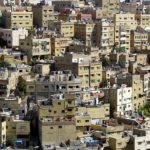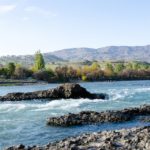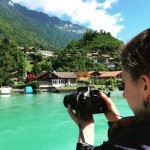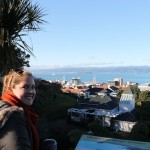Women in War Zones
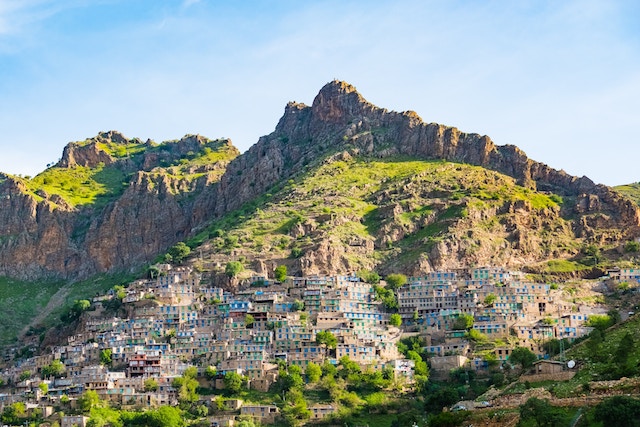
I had been asleep for nearly 13 hours when I saw the text from my mom.
“I need to talk to you ASAP.”
In fact, I knew what it was about; I had gone to a war-torn country without telling her. Being at the front with Peshmerga forces kilometers away from Islamic State in Iraqi Kurdistan didn’t put my stomach into such knots as seeing that text from my mother.
Why did I go? she asked. Think of all the people I could hurt if something happened, she pleaded.
I knew the risks. The first night in Erbil, the regional capital, was restless. I had a nightmare that Islamic State stormed the hotel and took me captive after my fixer turned me in for a $150,000 prize for my head. But when I woke up and went down for breakfast, the Arab staff – mostly refugees from Mosul, Ramadi, or some other city under the clutches of Islamic State – were pleasant and accommodating.
Flying from Tel Aviv to Amman and then onto Erbil, when the pilot announced our landing, there was no mention of Iraq; it was “Welcome to Kurdistan.” My Israeli work visas in my US passport rose nary an eyebrow at customs.
My Israeli work visas in my US passport rose nary an eyebrow at customs.
The reason for the Kurdistan visit was to get a first-hand account of the people leading the strongest charge against Islamic State, one of the most – if not the most – dangerous threats to the world. Their hardline Sunni-Muslim fanaticism has them believe they are creating a perfect and just society; where non-believers are beheaded with rusty knives, homosexuals are thrown from six story buildings, women are sold as sex slaves, and thousands are murdered.
The Kurds are an ethnic group native to the mountainous regions that extend from southern Turkey, northern Syria, northern Iraq and western Iran. The Kurdistan Regional government, in northern Iraq, operates as an autonomous entity, but still coordinates with the Baghdad government.
Differences in political and ideological beliefs are just a few of the reasons why the Turkish, Syrian, Iraqi and Persian Kurds have not unified; but at no point in their history have they made as much progress on independence, growth and security as they have in the past few years.
It didn’t hit me until later that when in a mall café, there was a “single” and “family” section; “single” meaning for men only and “family” for women, families and mixed company.
Ironically, Islamic State may have had something to do with that.
In the summer of 2014, the Kurds were monitoring the advances made by Islamic State through Syria and Iraq. Yet, with no immediate danger posed to them and no declarations by the jihadists of aspirations into Kurdish areas, the Kurds believed they could maintain a border. But that all changed in June, when IS overtook the Sinjar Mountains and captured the city of Mosul in the northeast of Iraq, before heading south to the oil-rich city of Kirkuk.
The Peshmerga – the Iraqi-Kurdish militia – pushed back the Islamic State forces, reclaiming the surrounding area of Mosul (pausing 30 km. from the city), creating a barrier around Kirkuk, and after intense fighting managed to take back the Sinjar Mountains.
As Iraq stands now, the Kurds patrol and fight IS along a 1,000 kilometer front line, virtually dividing the country. While the Kurdistan Regional Government, established in 2003 after the US invasion of Iraq, still cooperates with Baghdad, many curse the Iraqi government and its army for its incompetence and accuse it of withholding money.
But even with all this tumult, to be in Erbil, the capital, or to visit Dohuk, a picturesque mountain city in the northwest, one doesn’t feel it. There are shopping malls, cinemas showing the latest releases and waterparks to provide respite from the summer heat.
There are shopping malls, cinemas showing the latest releases and waterparks to provide respite from the summer heat.
Kurdish society is traditional. Alcohol is usually found only in the Christian areas, and men and women don’t usually congregate together. It didn’t hit me until later that when in a mall café, there was a “single” and “family” section; “single” meaning for men only and “family” for women, families and mixed company.
In Erbil’s main outdoor bazaar, men sit all day drinking tea in cafes that ring around a covered casbah. Inside, hijab-covered women with children in tow, or even more Western-thinking women with their hair free, wander in and out of shops.
Women in War Zones
While walking around the city, as a woman, I never felt harassed or made to be an object. I took care to dress modestly in general, but it was surprising to realize that I felt cooler and more protected from the sun with my arms and legs covered than in shorts and a tank top.
Traveling with two men was probably more secure, but more often than not I would wander away or stray behind. At a chicken-sandwich shop filled with men, the cashier took my order nonplussed.
***
The Harshan Refugee camp, a 15 minute drive from the center of Erbil, is at the end of a road lined with well-to-do middle class, two floor houses on one side, and construction on new high rise apartment buildings on the other.
With 1,400 residents, this is Erbil’s smallest refugee camp; there are nearly 1.5 million internally displaced Iraqis, almost all of them taking refuge in the Kurdish region in the north. Some refugees take shelter in unfinished buildings, and the more well off – some not even claiming refugee status – rent rooms for months at a time in hotels.
At the camp, men, women and children are sporadically seen on the dirt packed roads between their shanty tents.
At the camp, men, women and children are sporadically seen on the dirt packed roads between their shanty tents. Signs from various NGOs display the sanitary way to defecate and or promote immunization shots for children. A bakery is working around the clock churning out fresh flat bread, children mill in and out of a clean and colorful playground, and two women exit a caravan, part of an orderly set, where skills-training is given.
But this doesn’t diminish the sad and depressing reality of families, mostly from the Mosul area, fleeing ISIS, and now left with makeshift tents, sewage system run through dirt canals, and children who don’t smile.
Zena, 43, is a mother of nine and is one of the “luckier” families to be given two caravans. One has mattresses stacked to the ceiling, taken down at night for sleeping; the second is usually used for food preparation and eating. They’ve fashioned a chicken coop out of spare wood but the chickens are nowhere to be seen. Zena, barefoot and wearing a cheetah patterned hijab, relates the worst of her troubles, how her 10-year-old son Mohammed is suffering from a chronic head injury, wounded in a blast while they were still living in Bartala.
Signs from various NGOs display the sanitary way to defecate and or promote immunization shots for children. Women in War Zones.
Before the war came to them Zena was a homemaker and her husband was a truck driver. Now, he is a day laborer in Erbil and the family has little to no hope of making enough money to move out of the refugee camp. Yet they believe they’ll return home, even more, in a year’s time.
For her son Mohammed, Zena desperately wants to get him out of the country and to receive medical care in Europe. She said the five surgeries have left them completely broke, and now she relies on loans from her neighbors or the kindness of strangers. Zack Huff is one such stranger, a native of Idaho who volunteered for the IDF, he’s been spending the last few weeks in Erbil trying to help out in any way he can. The last time Mohammed had to be taken to the hospital, Zack brought him there and paid for the cab fare. When Zena sees him her face lights up and they grasp hands warmly.
***
“They always check for written permission, but I usually just come because I have a good relationship with the general.”
This is Vager Saadullah, our fixer and a journalist from Dohuk. He’s arranged to take my colleague and I to a military base in a small Christian village 30 kilometers from Mosul; which has been under control of IS for the better part of year. The Peshmerga retook the village shortly after IS’s blitz for territory, but none of the villagers have returned, and flags of different units hang from the balconies of these homes, their defacto encampment.
In the wrinkles on their faces and preservation of their traditional dress is the history of the Kurdish struggle in Iraq.
I didn’t know what to expect, but after we get out of the car and are led to one of the houses, walking into a room with seven veteran Peshmerga Generals and Captains certainly wasn’t it. Before me is the testament to resistance against the evil Saddam regime. In the wrinkles on their faces and preservation of their traditional dress is the history of the Kurdish struggle in Iraq.
Women are not found among this group of fighters. The fabled female Kurdish warriors are mostly from Syria’s People’s Protection Unit (YPG) and in Iraq, there are few, if any, women fighters.
That was certainly the case when I walked into the sitting room. There was a very, pregnant pause as the Generals didn’t know what to make of the one woman in the room. They didn’t extend their hands so I kept mine clasped together. I tried to convey respect and purpose with a meaningful look and a kurt nod. “Hello,” I said to each man, in a low, quick cadence. My colleague and I sat down and began the interview.
There was a very, pregnant pause as the Generals didn’t know what to make of the one woman in the room.
Forty-five minutes later the ice had broken and we had quality material. The veteran Peshmerga told us of their history fighting Saddam, their confidence in their power to repel Islamic State, and their disgust with the Iraqi army for abandoning their posts and letting IS loot their stores of high quality US-made weapons.
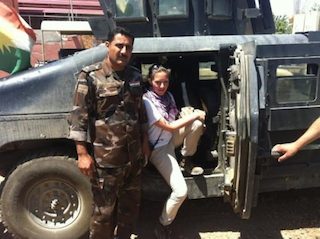
Women in War Zones
We were then brought to see the front line, an 8-foot tall dirt burm that stretched for kilometers, almost like World War I trench warfare. The men who guard these positions stay for 20 days at a time. They sleep, cook and eat at the burm. They told us stories of suicide bombers and night-time raids; how two IS fighters tried to climb over the burm with a wooden ladder. I could see the ladder off to the side.
A prize? A reminder? An older Peshmerga fighter, around 50 or so with a thick mustache and wearing the traditional baggy tunic and pants showed us a picture on his smartphone. It was him standing over two dead IS fighters, brandishing his Soviet-era rifle like he was posing with game. Around 4 or 5 kilometers away across the no-mans land, IS fighters were burning tires to obscure their position.
We returned to the base for an interview with the deputy-general. At this point I felt the men were getting used to my presence and when the deputy-general arrived, he grabbed my hand heartily and gave it a good shake. I took up the chair next to him the general offered us each a slim cigarette before we began the interview.
There was a very, pregnant pause as the Generals didn’t know what to make of the one woman in the room.
He also told us stories of heroism from decades earlier; from wars fought in the mountains against Saddam. He spoke with pride of his fighting force but just like the general before him, reiterated that it was weapons the Peshmerga needed the most, and that they needed to be directly armed.
Kurdish hospitality dictates that sugary tea is drank at each meeting and generously refilled without prompt. Combine that with the blazing Iraqi sun and the need to drink lots and lots of water, I finally asked to use the bathroom.
It was a bit surreal being led through a modest and tastefully decorated home – one could easily imagine the family that once lived there – but instead there are soldiers lounging, looking at cell phones or watching pre-Ramadan dramas on a flatscreen TV. The kitchen was cramped with young men preparing our lunch. I tried to compare the image of this assembly line of military expediency with the image of a simple woman – a wife and mother, and maybe her daughters – preparing a weekend meal.
The toilet, of course, was eastern style, a squatter, and it was used by, of course, military age men.
The toilet, of course, was eastern style, a squatter, and it was used by, of course, military age men. Again, I thought of the family. Who were these people that had picked out the flowery tile and what do they think of their home now being so generously used by the Peshmerga.
The generals had told us that some of the families had returned to collect some of their belongings, but that was all that was really said. Their home is on the front line, it’s not safe to return, and better the Peshmerga have it than the Islamic State.
***
My colleague and I told very few people about our trip, and didn’t access any social media while we were abroad. It wasn’t until we landed at Ben-Gurion airport and made it through passport control that we felt our trip had been a success. Immediately my colleague started posting pictures and statuses on Facebook.
Which led to the text message, and then a condemnation from my two older brothers through my mom.
I kept texting my family trying to get them to Skype, wanting to tell my mom and dad with the reassurance of my voice, hoping it’d soften the blow. But in the end, I was undone in that typical millennial way. Over eager to receive validation of my bravery and adventurous spirit, my sister-in-law saw posts on Facebook. She told my brother, who in turn told my mom.
Which led to the text message, and then a condemnation from my two older brothers through my mom. (Which, with one a former NYPD police officer and the other a Captain in the Marines, I was confused for the outcry.)
“They said, ‘Talk to her, she listens to you,” my dad related when we finally got to talk on Skype. “I told them, ‘She has to live her life!’”
Women in War Zones
I do think differently about the situations I’m willing to put myself into. I’m lucky enough that my current job affords me the freedom to explore stories I’m interested in, but the security that I don’t have to put myself in danger to stay ahead of the competition.
But I’ll admit that I’m not immune to the rush of that drug adrenaline. Women in war zones in general, and personally for me to be a woman and afforded the opportunity to change peoples perceptions, either of myself or the stories I cover, that’s the biggest rush of all.
Women in War Zones
Related Reading
Woman in the War Zone: A Conversation with Iraq War Correspondent Megan Greenwell
Have you been to a war zone or spent time with women in war zones and want to share your story? Email us at [email protected] for information about sharing your experience with the Pink Pangea community.
Women in War Zones photo credits: Laura Kelly and Unsplash (top).



